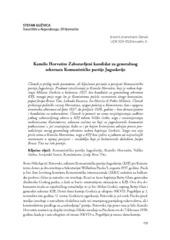Приказ основних података о документу
Kamilo Horvatin: Zaboravljeni kandidat za generalnog sekretara Komunističke partije Jugoslavije
Kamilo Horvatin: A Forgotten Candidate for General Secretary of the Communist Party of Yugoslavia
| dc.creator | Gužvica, Stefan | |
| dc.date.accessioned | 2022-06-27T10:15:16Z | |
| dc.date.available | 2022-06-27T10:15:16Z | |
| dc.date.issued | 2019 | |
| dc.identifier.uri | http://rifdt.instifdt.bg.ac.rs/123456789/2569 | |
| dc.description.abstract | Članak je prilog malo poznatom, ali ključnom periodu u povijesti Komunističke partije Jugoslavije. Predmet istraživanja je Kamilo Horvatin, koji je nakon hapšenja Milana Gorkića u kolovozu 1937. bio kandidat za generalnog sekretara KPJ, mnogo prije nego što je Kominterna počela razmatrati druge komuniste, poput Josipa Broza Tita, Labuda Kusovca, Ive Marića ili Petka Miletića. Članak prikazuje politički razvoj Horvatina, njegov položaj u Kominterni, kao i njegovu dvostruku aktivnost od ljeta 1937. do proljeća 1938. godine – kao denuncijatora i kandidata za rukovodstvo. Članak će pomoći ne samo razjašnjavanju sudbine jednog zaboravljenog aktera u KPJ tokom Velike čistke, nego i razumijevanju mehanizama Kominterne, odnosno načina na koji su jugoslavenski komunisti potkazivani i, još značajnije, kako se i po kojim kriterijima odvijao proces pronalaženja novog generalnog sekretara nakon hapšenja Gorkića. Stoga ovo nije priča samo o Kamilu Horvatinu, nego o KPJ kao cjelini u jednom od najvažnijih momenata u njenoj povijesti – razdoblju koje je kulminiralo dolaskom Josipa Broza Tita na čelo partije. | sr |
| dc.description.abstract | This article deals with the hitherto unknown story of Kamilo Horvatin as a candidate for the position of the General Secretary of the Communist Party of Yugoslavia (KPJ) in 1937-1938. A veteran communist, Horvatin worked as a party representative to the Comintern at the time when the General Secretary of the party, Milan Gorkić, was arrested by the NKVD in August 1937. For the next six months, under the patronage of Wilhelm Pieck, Horvatin became the only trustworthy Yugoslav communist in the eyes of the Comintern. That was long before any of his rivals, such as Josip Broz Tito or Petko Miletić, were considered for the leadership position. Horvatin was both a denouncer of his fellow party comrades and a leadership candidate with constructive proposals on how to renew the work of the KPJ. He was the first person within the KPJ to suggest that traitors and police agents might infiltrate to the top party positions, and he distrusted all the other leading communists. Simultaneously, he juxtaposed his own vision of the Popular Front – in which the KPJ played a leading role on the anti-fascist left – with the earlier design of Gorkić, which Horvatin claimed resulted in the communists’ submission to the bourgeois opposition. Horvatin also hoped to move the party leadership back to Yugoslavia, as it had been scattered around Europe due to police repression. Finally, he wanted to rely on union leaders within the party to form a new leadership, picking cadres who had previously belonged to the “left” faction in the KPJ. Most of Horvatin’s policy proposals were later put into action by Josip Broz Tito, although evidence shows that the two did not have any mutual contact at the time. Horvatin, previously close to Tito, began to see him as another potential spy from Gorkić’s inner circle, and wrote very negatively of him. Unlike Horvatin, Tito was a worker rather than an intellectual, and was largely untainted by factional disputes among Yugoslav émigrés in Moscow. This helps partially explain why Tito survived and went on to become the new general secretary, while Horvatin was arrested in February 1938 and shot a month later. This article helps us understand not only the forgotten life story of a particular Yugoslav communist, but the broader dynamics of repression and politics within the KPJ in this period. Rather than micromanaging Yugoslav party affairs, the Comintern expected the Yugoslavs to sort out their problems independently. The general directives and the final word came from the Comintern, but the members of the KPJ were not to be mere passive observers – they were expected to come up with constructive policy proposals. Those who offered a clear vision for the future, first Horvatin and then Tito, eventually managed to gain the attention of the Comintern. | sr |
| dc.language.iso | sr | sr |
| dc.publisher | Društvo za hrvatsku povjesnicu | sr |
| dc.rights | openAccess | sr |
| dc.rights.uri | https://creativecommons.org/licenses/by/4.0/ | |
| dc.source | Historijski zbornik | sr |
| dc.subject | Komunistička partija Jugoslavije | sr |
| dc.subject | Kamilo Horvatin | sr |
| dc.subject | Kominterna | sr |
| dc.subject | Josip Broz Tito | sr |
| dc.subject | Sovjetski Savez | sr |
| dc.subject | Velika čistka | sr |
| dc.title | Kamilo Horvatin: Zaboravljeni kandidat za generalnog sekretara Komunističke partije Jugoslavije | sr |
| dc.title | Kamilo Horvatin: A Forgotten Candidate for General Secretary of the Communist Party of Yugoslavia | sr |
| dc.type | article | sr |
| dc.rights.license | BY | sr |
| dc.citation.issue | 1 | |
| dc.citation.volume | 72 | |
| dc.citation.spage | 139 | |
| dc.citation.epage | 164 | |
| dc.type.version | publishedVersion | sr |
| dc.identifier.fulltext | http://rifdt.instifdt.bg.ac.rs/bitstream/id/9043/HZ-1-2019_za_web_08.pdf | |
| dc.identifier.rcub | https://hdl.handle.net/21.15107/rcub_rifdt_2569 |

